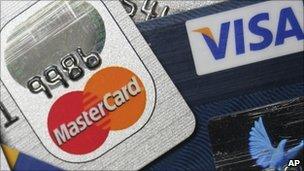PayPal says it stopped Wikileaks payments on US letter
- Published
PayPal's Osama Bedier: "Our policy group had to make the decision of suspending the account"
PayPal has said that its decision to stop people from using its service to make donations to Wikileaks was made after a letter from the US government.
A vice-president at the online payments firm said the State Department had said that the activities of the website were illegal in the US.
PayPal suspended payments to Wikileaks last week, and has been followed by Visa Europe and Mastercard.
Amazon and Swiss bank PostFinance have also cut ties with Wikileaks.
PayPal's vice-president Osama Bedier told a conference that the company's acceptable use policy group had decided to suspend Wikileaks' account after the State Department sent a letter on 27 November, adding that it was a "straightforward" decision.
The company, which is owned by US online auction giant eBay, later clarified that Mr Bedier's comments referred to a letter sent from the State Department to Wikileaks, not directly to Paypal.
A State Department official also said the government department had not contacted Paypal.
US Assistant Secretary of State for Public Affairs Philip Crowley tweeted: "The US government did not write to PayPal requesting any action regarding #WikiLeaks. Not true."
Legal threat
On Tuesday, Mastercard said that it was suspending payments to Wikileaks "until the situation is resolved".

Datacell says Visa and Mastercard's decisions could harm its own business
This was followed by Visa Europe on Wednesday, which said it would be carrying out an investigation into the whistle-blowing website.
Visa Europe said it wanted to determine whether the nature of Wikileaks' business "contravenes Visa operating rules".
Both companies are now facing the threat of legal action from the IT company that enables Wikileaks to accept credit and debit card donations.
Datacell, which operates from Switzerland and Iceland, said it would move immediately to try to force Visa Europe and Mastercard to resume allowing payments to the whistle-blowing website.
Datacell claimed in its statement, external that Visa had come under political pressure and had "put priority on political influence over the law".
It added that the credit card company's actions were harming both Datacell and Wikileaks.
A spokeswoman for Visa Europe said it would not be making any comment regarding Datacell at this time. Mastercard has also yet to make a statement on the matter.
Mastercard has, however, commented on claims that pro-Wikileaks internet hackers had brought down its website.
Mastercard said there was "no impact" on people's ability to use their cards for transactions.
Datacell's chief executive Andreas Fink urged Visa to "just simply do their business where they are good at - transferring money".
Datacell added that the suspension would last for an initial seven days, but this has yet to be confirmed by Visa Europe.
The founder of Wikileaks, Julian Assange, was arrested in London on Tuesday, connected to sexual assault allegations in Sweden.
He was refused bail, but has vowed to fight extradition.